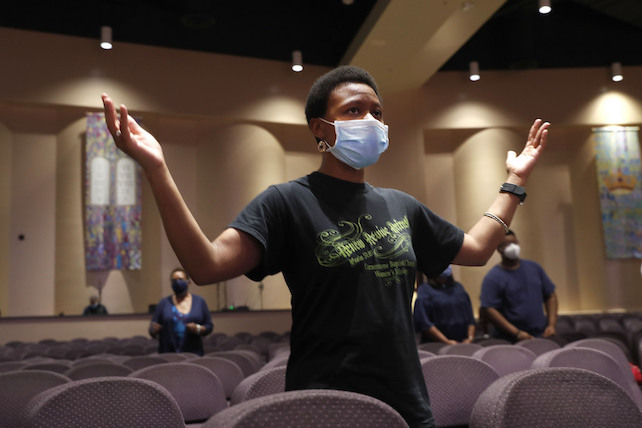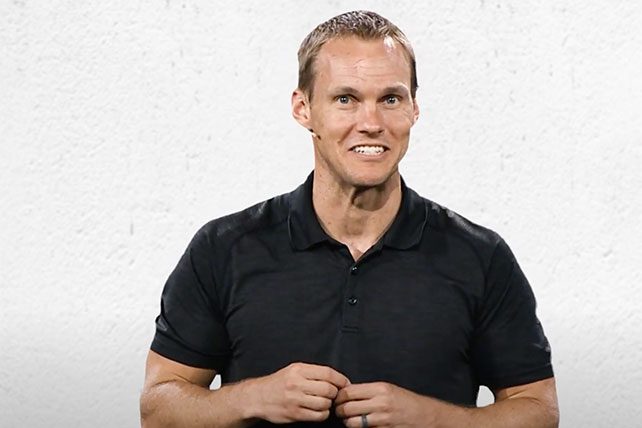The growing rate of biblical illiteracy within the Church is extremely troubling. More troubling still, however, is that this illiteracy is not for lack of reading scripture. According to a recent Barna Group study, 96% of those identifying as born-again Christians had read the Bible in the last seven days, while in another recent Barna study only 26% of born-again Christians claimed to base their moral decision-making on biblical principles. This means that we are reading the Bible, but it doesn’t appear to be making much of a difference in our lives.
Many of us go into Bible reading looking for anything but transformation, which is unfortunate, given that transformation is the primary reason the written word of God exists. Devotional Scripture reading requires discipline and consistency, but its aim is the treasuring of God’s word in our hearts and the delighting of ourselves in God’s statutes (Ps. 119:24). We have at our fingertips the very revelation of God to us, and yet we treat Scripture like a blunt instrument, like a reference book or a prop for our propaganda — anything but the wellspring of God’s truth to be drunk deeply from. Devotional Scripture reading means meditating on Scripture, chewing on it, savoring it, learning not just how to read Scripture, but how to feel it.
The Church by and large has lost her ability to feel Scripture. The great irony is that now when the Bible is more available than any time in history, we are perhaps more biblically illiterate than any Christian generation in history.
The crisis creates opportunity, however! The discipleship culture of the Church is now extra ripe for biblical transformation and a revival in commitment to the deep well of Scripture.
Here, then, are five ways one might begin to develop a greater feeling for Scripture. Some or all of these may not be new to you (and none were invented by me, of course), as they are basically good practices for essential Bible study. But put into regular practice, these approaches to study can condition us to feel Scripture more keenly.
1. Interpret Before You Apply
Too many Bible study classes are first asking, “What does this passage mean to you?” instead of leading with “What does this passage mean?”.
The primacy of application has dulled our understanding. Don’t jump the gun. Modern Christianity has really overestimated the value of “making the Bible relevant.”
Jesus says that if anyone wishes to follow him, he must deny himself and take up his cross (Mt. 16:24). When we leap to application first, we immediately diminish the powerful relevancy of this teaching. We make taking up crosses about dealing with irritating neighbors or a nagging boss, when these applications skip the primary meaning: taking up one’s cross is about death. Oftentimes, preoccupation with personal annoyances and aggravations is self-indulgence, not self-denial.
The Bible is already relevant! In our zeal to “make it” relevant to us, we often lose the excitement of its primary relevancy. Because Scripture is God’s revelation to us, it is imminently and enduringly relevant.
“Interpretation before application” is a fundamental element to all Bible study, but if our desire is to develop a greater feel for Scripture, we will more and more subject our feelings to Scripture’s unwavering revelation (interpretation) rather than subject Scripture to our feelings (what often happens in the applicational exercise).
2. Watch the Context
Sometimes those handy verse numbers in our Bibles are the culprit, or sometimes it’s the scattershot approach to verse presentation in the topical preaching popular right now in our nation’s pulpits. Maybe our soundbite and short-attention-span culture is the cause. Whatever the root, many of us have forgotten the cardinal rule of context.
Out of context, Jesus’ statement “I have come not to bring peace but a sword” (Mt. 10:34) makes him sound like Conan the Barbarian.
Out of context, Hebrews 6:4-6 seems to indicate that Christians can ultimately “lose” their salvation, and indeed many believers use these three verses to support that view. But two verses later (Heb. 6:9), the author of Hebrews is contrasting whatever is being described in Heb 6:4-6 with “things accompanying salvation.” If one isn’t looking at this full passage on the biblical page one may never see it.
We like to keep Scripture short and manageable, and that’s understandable. It’s certainly more convenient that way. But we will not be mastered by Scripture if we don’t occasionally allow it to overwhelm us, intimidate us, and force us to wrestle with it. Bite-size chunks are good for memorization and the like, but to feel Scripture, we have to drink from it deeply, exercising our minds and hearts, and we must do this constantly and repetitively. Keeping verses in context may prevent us from clearly understanding something right off the bat, but it will also keep us from inadvertently misunderstanding it right off the bat.
3. Make Connections
Scripture is cohesive, a great brilliant tapestry that is interwoven from the same fabric. Contrary to various theories both ancient and modern, God isn’t different from Old Testament to New, and Paul didn’t invent a different Christianity from Jesus’.
One of the most important things we can do in our Bible study time is make connections between the primary passage we’re studying and related passages elsewhere in Scripture. Typical topical study involves a pre-selected topic and then a few isolated verses that relate to the topic. But good Scriptural cross-connection involves a pre-selected passage and then a few other passages that are connected narratively, thematically, or theologically.
Losing our feel for Scripture has resulted from losing our sense of Scriptural continuity. It’s all connected; there are no coincidences. (Okay, that’s an exaggeration; there are some coincidences. But there are many more connections, particularly between Old Testament narrative and New Testament narrative, that testify to the premeditation of God’s revelation.)
For instance, in a small group study I once conducted, we looked at the story in John 6 about the disciples in the stormy waters and Jesus walking to them on the waves. One of our reflective exercises involved making connections. There is the obvious connection of the parallel narrative in Matthew’s Gospel. Then there are other, less obvious connections like Jesus’ declaration “It is I” recalling YHWH’s Old Testament self-declaration “I AM.” Jesus on the water reminded us of the Spirit hovering over the surface of the deep in the beginning of Genesis. The boat’s immediately going to the shore when Jesus boarded brings to mind God separating the land from the chaotic waters in the Creation story. The story itself reminded us of other stormy sea tales, as when Jesus slept below deck while the disciples fretted over a storm. Later in the narrative, the confused crowd and Jesus’ words about “food that does not spoil” reminded us of the disgruntled Israelites in Exodus and the manna that was only good for the day, of Jesus’ subsequent words on being the Bread of Life, and even of Jesus’ words to the Samaritan woman at the well about water that lives.
This is not to say that what one passage means in one place it also means in a place where you have made a connection. It is only to say that Scripture interprets Scripture, and that the more connections we make, the greater feel we will have for the brilliant unity of Scripture.
As you’re reading a particular passage, ask yourself, “What other passages does this remind me of?” Then track those down. Before you know it, you are making connections, and making connections cultivates in you a feel for the broader and fuller contours of the Bible’s story. Using the cross references listed in many study or reference Bibles helps tremendously in this regard.
4. Dynamically and Prayerfully Apply
When you’re ready to apply Scripture — remember, interpretation comes first — instead of applying a passage in a static sense, apply in a prayerful, dynamic sense. Here is the difference:
Static, Observational Application: Reading “Love bears all things” in 1 Corinthians 13:7 (ESV) and thinking, “This is important because my husband is really difficult to live with. He’s very burdensome.”
Dynamic, Prayerful Application: “Lord, give me the strength and passion to love my husband even when I find it very difficult. Change my heart to bear all things.”
The first approach is basic application. It is not invalid so far as it goes. But it is distressingly close to subjecting Scripture to our experience, rather than vice versa. Moreover, it is more observational than it is motivational. It only involves noticing something, not committing to something. This is why it is static; it doesn’t really move us.
The second approach, however, not only presses us to subject our feelings to Scripture — in the example, the application entails committing to doing something in response — but it also turns the application into a conversation with the One prompting the response. The reader isn’t just noticing, “Hey, this reminds me of my problem,” she is bringing that problem before the Lord and taking the initiative of being changed by Scripture’s addressing of that problem.
In the first approach the temptation is toward gracelessness, because the focus is on what must be endured (a difficult husband). This is counter to the core idea in the passage itself! This famous treatise on true love tells us that real love keeps no record of wrongs and that it believes and hopes “all things.”
In the second approach the impetus is toward grace, because the focus is on loving according to the Scripture’s call to deny ourselves.
This prayerful approach to application is a highly efficient way to begin feeling Scripture.
5. Make the Jesus Connection
Look for Jesus! All of Scripture either points to Jesus’ life and teaching or emerges from it. All of it.
To know God, you must know Jesus. And to feel Scripture most keenly, you must see Jesus between its lines and at the beginning and end of its many trajectories. He is there, all over the place, and Christians committed to following him closely will seek the glorious enlightenment of the disciples on the road to Emmaus (Luke 24). “Beginning with Moses and all the Prophets” Jesus himself “explained to them what was said in all the Scriptures concerning himself” (24:27).
When you’re in the Old Testament, wherever you are, ask yourself, “What does this say about Jesus? How does this point to Jesus? Did Jesus ever quote or refer to this? What is the importance of this in the light of Jesus?”
Finding Jesus in the Gospels is easy of course, but making the Jesus connection in the epistles is vitally important (again, particularly today when many are telling us that Paul’s teaching is wholly different from Jesus’). We ought to read the New Testament as if Jesus in the Gospels is giving us an artist’s palette and revealing a brand new array of colors never seen before, and as if Paul and the other New Testament authors are keen on teaching us how to paint with these new supplies.
Finding Jesus foreshadowed in the Old Testament narratives is a great way to infuse new life into study of those books. We suddenly do not read them as dry histories or moral tales akin to Aesop’s Fables but as the long, bumpy road to the Incarnation, where every sign along the way points to Jesus.
If you plan on keeping Christ at the center of your life, you must plan on keeping Christ at the center of your Christian practice, including your Scripture reading.
None of these practices are magic bullets, of course, and if you are a serious Bible student, you are no doubt already putting some or all of these tips into regular practice. If you are, you likely have a much greater feel for the brilliance and power of the Bible than the average disciple. Let us continue pressing further into the depth and breadth of the transforming Word of God, submitting our thoughts and feelings to it for the good of our neighbors and for the glory of the Author.
This article originally appeared here.
















